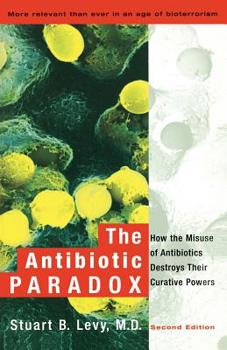The Antibiotic Paradox
Select Format
Select Condition 
Book Overview
The discovery of antibiotics heralded medicine's triumph over previously fatal diseases that once destroyed entire civilizations -- thus earning their reputation as miracle drugs. But today, the terrifying reality of antibiotic-resistant bacteria resulting from our widespread misuse of antibiotics forewarns us that the miracle may be coming to an end. The seemingly innocent consumer who demands antibiotics to treat nonbacterial diseases such as the...
Format:Paperback
Language:English
ISBN:0738204404
ISBN13:9780738204406
Release Date:January 2002
Publisher:Da Capo Press
Length:376 Pages
Weight:0.96 lbs.
Dimensions:1.0" x 5.4" x 8.2"
Customer Reviews
2 ratings
Resistance can lead to disease outbreaks
Published by Thriftbooks.com User , 22 years ago
The Antibiotic Paradox appears in a newly revised second edition to update information on the misuse of antibiotics in general and Cipro in particular, linking new mutations of bacterial resistance to the overuse of Cipro and other important antibiotics. Resistance can lead to disease outbreaks: The Antibiotic Paradox examines the build-up of new antibiotic-resistant bacteria and examines medical and social trends in treatment options.
The book was well explained and educational
Published by Thriftbooks.com User , 25 years ago
Could the chemicals that help us survive today become useless in the near future, leaving us defenseless against dangerous bacteria. This is a very real possibility. In The Antibiotic Paradox by Plenum Press, Stuart Levy confronts this problem. Antibiotic resistance is not a new problem it has been known about since antibiotics were discovered. Still, we are learning more about how it works. The book also talks about how it can be controlled. The first antibiotic was penicillin, which was extracted from a mold. Penicillin was used in small quantities in WW2. Alexander Fleming, the discoverer of penicillin, warned that if many small doses of penicillin were given then the microbes would be educated to resist the medicine. As more kinds of antibiotics were discovered the problem of resistance seemed unimportant. This is despite studies during the 40's and on that more and more resistant bacteria are being found. How are these bacteria becoming resistant? There are a couple ways that bacteria can become resistant. These ways are all started by an initial mutation. In a colony of bacteria one or two might have a certain mutation that makes them resistant to an antibiotic. When an antibiotic is used to kill that colony, the only bacteria left are the resistant ones. Now those bacteria have no competition for resources and they start to multiply more quickly. So there now is a colony of antibiotic resistant bacteria. Often the bacteria is harmless so we are not going to get sick but sometimes it is a disease causing bacteria. There are two ways that bacteria can resist an antibiotic. One is that the outer membrane is not very permeable to the antibiotic. The other is the bacteria can secrete an enzyme that destroys the antibiotic. The second is more dangerous because the harmless bacteria could be secreting this enzyme and destroying the antibiotic which will enable the harmful bacteria to survive. The other problem is sometimes harmless bacteria gives their plasmid, which contains a resistance gene, to harmful bacteria who will then become resistant. How can we keep the bacteria from becoming resistant to all our drugs? This is where the paradox comes in, how can we use antibiotics effectively without allowing bacteria to become resistant to them? First, we have to limit the use of antibiotics. They should be used only when nothing else will work and only when it is necessary. This is often hard because patients might demand to have the drug when it is not needed, but the doctors must make the final decision. There also are places where no restriction on use is followed. For example on resistant strain of bacteria was traced to brothels in Vietnam where penicillin was given to prevent disease in the women. Scientists have also found bacteria that are resistant to multiple antibiotics. This is why we need to control the use of them so all of them don't become useless. We need t





